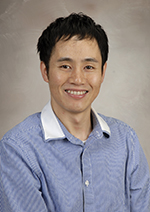Tsuchikama lab develops promising treatment for brain tumors

Recent research from the lab of Kyoji Tsuchikama, PhD, associate professor in the Texas Therapeutics Institute at the Brown Foundation Institute for Molecular Medicine, showing the ability of their antibody-drug conjugate (ADC) to deliver anti-tumor payloads to brain tumors has been published in Cell Reports.
ADCs are biopharmaceutical drugs containing extremely potent anti-cancer agents used to directly target specific types of tumor cells. Though in their infancy, ADCs are an emerging drug class for cancer therapy, however not a reliable treatment for brain tumors, including glioblastoma (GBM). A natural protection of the brain, the blood-brain barrier protects brain tissues from toxic molecules, however this barrier also limits drugs from reaching tumors.
The lab set its focus on discovering why ADCs for GBM fail to show positive results after advancing to clinical trials. In their research, the authors tested how the molecular heterogeneity of each ADC negatively impacts therapeutic efficacy by preparing ADCs without molecular heterogeneity (homogeneous ADCs) using conjugation technology developed by the lab.
Following this, the group assessed therapeutic efficacy of the ADCs in several preclinical brain tumor models and evaluated the degree of accumulation of each ADC in brain tumors after intravenous administration.
Their findings showed that the lab’s homogeneous ADCs showed improved payload delivery to brain tumors and much-improved therapeutic effects in brain tumor models compared to conventional conjugates with heterogeneity.
“We also demonstrated that a part of molecules in heterogeneous ADCs contributed to poor brain tumor targeting across the BBB, which likely explains why conventional ADCs failed to show great therapeutic effect,” said Yasuaki Anami, PhD, instructor in the Tsuchikama Lab and the first author of the paper. “These results indicated that ADC homogeneity is a critical parameter for maximizing efficacy of ADCs in brain tumors.”
Moving forward, the lab will continue to test the efficacy and safety of its ADC in more clinically relevant models before advancing the ADCs into in-human studies.
“Our findings provide rational molecular design for generating efficacious ADCs for brain tumor treatment,” Tsuchikama said. “We believe further development of ADCs based on our findings will provide patients suffering from this devastating disease with access to promising treatment options.”
“Drug discovery is a complex process and team effort,” said Zhiqiang An, PhD, professor and Robert A. Welch Distinguished University Chair in Chemistry and co-author of the study. “This work exemplifies the synergy of multiple expertise such as antibody engineering, conjugation chemistry, and brain cancer biology within the Texas Therapeutics Institute and UTHealth, which led to the success of this project.”
Contributing authors for the paper include Anami; An; Tsuchikama; Yoshihiro Otani, MD, PhD; Wei Xiong, MD, PhD; Summer Y.Y. Ha, PhD; Aiko Yamaguchi, PhD; Kimberly A. Rivera-Caraballo; Ningyan Zhang, PhD; and Balveen Kaur, PhD.